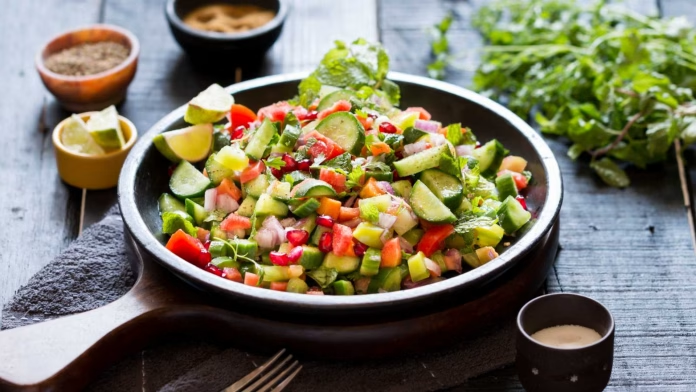In recent times, many individuals have turned to salads as a substitute for traditional Indian meals in an effort to reduce calorie intake and promote weight loss. However, the question remains: Can salad truly replace the nutritional value and benefits of Indian food?
The answer is not straightforward, as salads have their own advantages and disadvantages. Nutrition specialists have differing opinions on whether replacing a meal with a salad is a healthy choice.
This article aims to explore the pros and cons of salad as a meal replacement and compare it to the nutritional benefits of a traditional Indian meal.
The Nutritional Value of Salad vs Indian Food:
While salads are often praised for their low-calorie content and high fiber, iron, and calcium levels, they may not provide the same level of complete nutrition as a traditional Indian meal. A balanced Indian meal typically includes elements such as roti (bread), rice, vegetables/meat, dahi (yogurt), and a dash of ghee (clarified butter). These components offer a wide range of nutrients, including carbohydrates, proteins, gut-friendly bacteria, and healthy fats.
Indian cuisine also incorporates spices like turmeric and ginger, known for their numerous health benefits. Turmeric, used in curry preparations, has anti-cancer properties, while ginger acts as a potent antioxidant and anti-inflammatory agent, boosting immunity. These additional benefits are not commonly found in salads.
The Importance of Balance:
When considering whether salad can replace Indian food, it’s essential to recognize the importance of a balanced meal. While salads may be low in calories and aid in weight loss, they may not provide all the necessary nutrients required for optimal health. On the other hand, a well-rounded Indian meal encompasses a variety of food groups, offering a more comprehensive nutritional profile.
Our Verdict:
While salads have their merits, they may not be able to fully replace the nutrient-rich benefits of a traditional Indian meal. While salads excel in their low-calorie content and fiber-rich nature, Indian cuisine provides a well-rounded array of nutrients from various food groups. The inclusion of carbohydrates, proteins, healthy fats, and beneficial spices make Indian food a complete and nourishing choice.
Ultimately, the decision between salad and Indian food depends on individual dietary needs and goals. It is important to consider factors such as calorie intake, nutrient requirements, and personal preferences. Consulting with a nutritionist can provide valuable guidance on creating a balanced diet that incorporates the benefits of both salads and traditional Indian meals.





